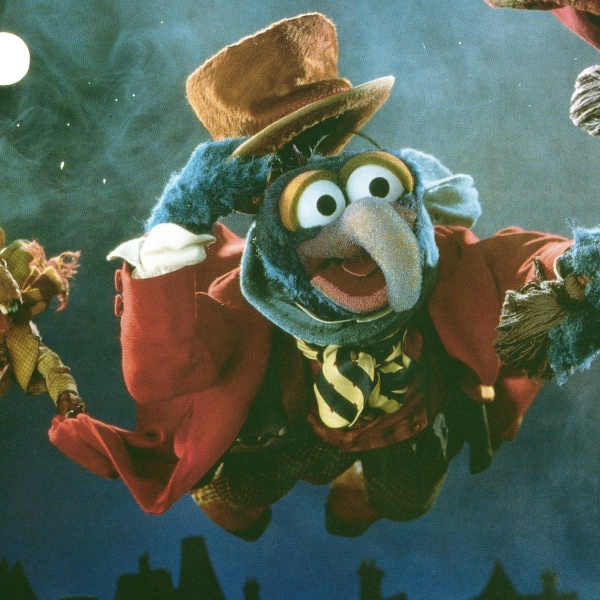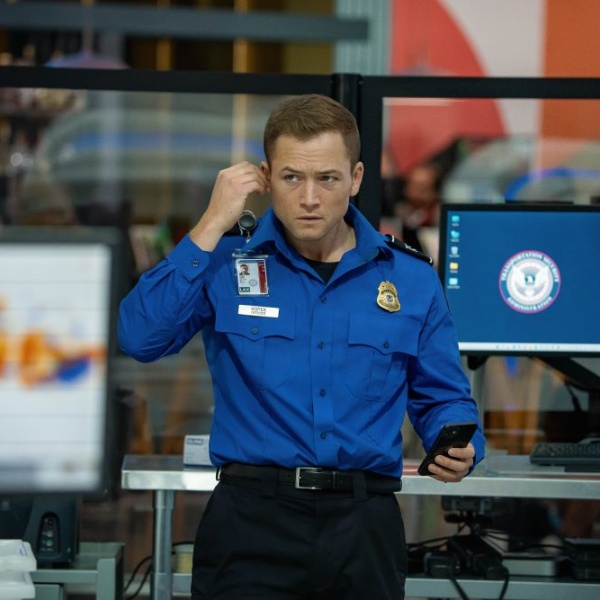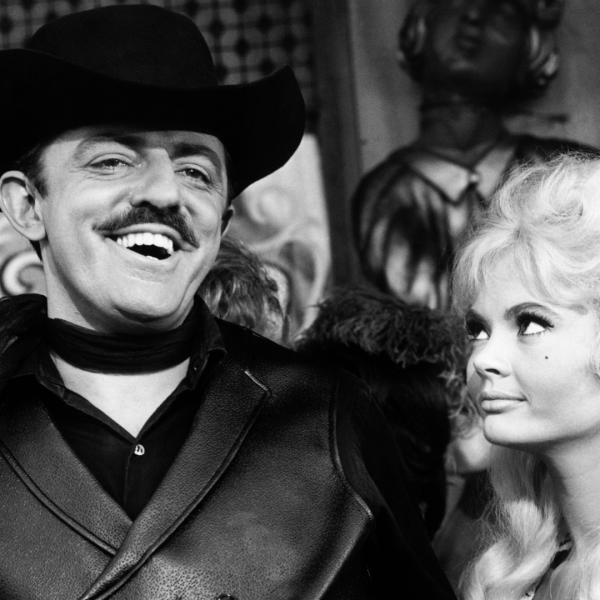To a degree, every film is political. Some are political with a small p — the insidious militarism in Michael Bay’s “Transformers” films might go over the heads of many audience members, but it’s there. Some are Political with a big P, setting out from the start to campaign on a certain issue, with even silly comedies like “The Other Guys” getting in on the act. And some are specifically about politics, getting into the nitty-gritty of elections, of glad-handing, of delegate counts and filibusters and bills and speeches.
The relationship between Hollywood and Washington has always been a tempestuous one, the movies as happy to point out the corruption in the political world as politicians are to point out the moral depravity of films, and the latest to get involved is George Clooney, whose new film, “The Ides Of March,” opens today. Clooney’s always been one of the most politically engaged movie stars of his generation, and after Oscar-nominated success for his period drama “Good Night and Good Luck,” he’s taken on a more contemporary look at the political world in ‘Ides.’ And the good news is, it’s pretty terrific; a gripping, impeccably performed film that’s as convincing a look at the spin and hypocrisy of modern politics as any in recent years.
In celebration of the film’s release, we’ve gone back to look at some notable movies centered on the political world. As we’ve said, these films aren’t just political ones, but about the political process itself, about how the sausages are made, as it were, so certain movies didn’t quite qualify. But if Clooney’s glimpse behind the curtain gives you a taste for this type of fare this weekend, the list below is a good primer of where to start. Check it out after the jump.
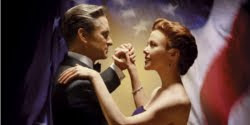 “The American President” (1995)
“The American President” (1995)
If you like Aaron Sorkin — particularly his ace political drama “The West Wing” — you’re likely to be charmed by the screenplay he wrote for “The American President” and its romantic, idealistic look at a president, his bid for reelection, and the woman he loves. However, if you don’t quote Josh Lyman and Isaac Jaffe at dinner parties (we ‘West Wing’ fans make awesome guests), then you’ll end up with your eyes exhausted by two hours of constant, ceiling-scraping rolling. Michael Douglas stars as President Andrew Shepherd, a widower who narrowly won office after the death of his wife. He meets environmental lobbyist Sydney Ellen Wade (Annette Bening), and their romance rattles the American people, dipping his approval numbers into Obama territory as he’s beginning to campaign for a second term. The biggest issue in “The American President” isn’t the cheesy direction of mid-‘90s-era Rob Reiner; instead it’s the demonization of Shepherd’s political rival, Bob Rumson (Richard Dreyfuss, missing only a mustache to twirl). A mere 114 minutes isn’t a great deal of time to fully develop the relatively minor character, but a single moment allowing Rumson to be a human who cares about his country (rather than an egomanic intent on abolishing freedom) would’ve gone far in creating a more complex, interesting film. But the film isn’t about Rumson; he’s merely a character who pushes Shepherd into making stirring speeches that allow Sorkin’s wit, passion for politics and love of preaching to shine. With Shepherd and “The American President,” we get glimpses of the greatness to come with President Jed Bartlet (sigh) and “The West Wing,” and that’s enough to keep us engaged and wishing for a ballot to cast. [B]
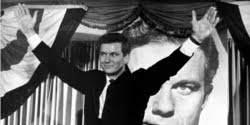 “The Best Man” (1964)
“The Best Man” (1964)
Generally speaking, party conventions tend to serve as coronations for presidential candidates these days, rather than photo-finishes; the outcome of the nomination hasn’t been in doubt at that point since Ronald Reagan nearly unsat Gerald Ford at the 1976 Republican National Convention. But at one time, the conventions were home to backroom deals and breakneck negotiations, and no film better embodies that than “The Best Man.” An adaptation of Gore Vidal’s 1960s play, helmed by Franklin J. Schaffner, the undervalued director who went on to make “Planet of the Apes,” “Patton” and “The Boys From Brazil,” the film features two presidential candidates, intellectual William Russell (Henry Fonda) and the brash, Kennedy-esque Joe Cantwell (Cliff Robertson), who are courting a dying ex-President (the Oscar-nominated Lee Grant) for his endorsement, one that is sure to clinch the nomination. An obvious precursor to, and inspiration for, “The Ides of March,” it’s an enjoyably nasty little dogfight of a movie, the two candidates seemingly prepared to go to any lengths to slander their opponent, and Vidal’s zippy, acerbic script has no end of memorable exchanges. It risks feeling a little stagy in places, but Haskell Wexler’s typically excellent camerawork mostly staves that off, while never letting the focus drift from the excellent performances. Indeed, Robertson has rarely had a better showcase, and it’s one of Fonda’s most interesting pre-Leone subversions of his persona, coming hot on the heels of the thematically similar “Advise and Consent,” and in the same year as another presidential role, in Sidney Lumet’s “Fail-Safe.” [B]
 “Bob Roberts” (1992)
“Bob Roberts” (1992)
Who is Bob Roberts? It’s a testament to Tim Robbins’ directorial debut, a film that people still discuss today, that everyone has a different answer. Robbins plays Roberts, a “self-made” political candidate who develops a strong grassroots connection to “the people” by espousing anti-government, anti-liberal sentiment. Yep, Robbins saw the Tea Party coming a mile away. Sure the picture may take on a more insidious feel in 2011, but that ignores the ingratiating charm of Robbins’ Roberts, who sneers with a smile and smiles with a sneer as he strums his guitar and sings ditties about the lower class being lazy and full of complaints. “Bob Roberts” keeps the truth at bay with the structure of a mock-documentary, and aside from all the famous faces that appear, the illusion seems pretty airtight, with an uncomfortable ambiguity to the director’s lens that avoids, ahem, “gotcha” moments until the very last, disturbing gag. It’s “The Manchurian Candidate” as directed by Christopher Guest, at once wildly funny and incredibly plausible, with Robbins receiving great support from Giancarlo Esposito as an intrepid liberal reporter, Alan Rickman as a sleazy campaign manager, and loads of cameos that memorably include John Cusack as a fringe comedian who backs out of his own sketch comedy show when Roberts guest stars. Wildly funny and creepy in all the right ways. [A]
 “Bulworth” (1998)
“Bulworth” (1998)
So guess what’s firmly stuck in the 90s alongside America Online and Koosh Balls? That’d be the last picture by director Warren Beatty, a satire somewhat based on the political gadfly John Jay Hooker. The “Bonnie and Clyde” actor plays the titular senator, a former Democrat moving closer to the center and accepting buy-outs in order to gain popularity. But just as the movie opens, Bulworth’s had it with the fakeness and decides to set-up his own assassination. That is until he decides to call out the entire game, immerse himself in urban African-American culture, and start rapping/rhyming most of his lines. If it sounds insane, it is, but it’s unfortunately not particularly funny. Despite “Mad TV” probably wanting you to believe otherwise, was watching an older white male rapping ever funny? Perhaps a little more so at the time, but a rewatch more than a decade later isn’t kind, showcasing production values akin to contemporary cop shows and obvious jokes and character interactions. It’s a shame because the very beginning cracks and pops in an exciting, fiery fashion with actors supremely dedicated to their roles, without becoming overly showy. If it feels like Aaron Sorkin, that’s because it is Aaron Sorkin, who happened to do some rewrites on the script, with James Toback. And despite its dated look and lack of laughs, the movie makes a number of good points about the political game that are still, unfortunately, relevant today — look no further than Beatty’s attack on the healthcare “business.” Still, it’s weird to see the director create a character who is blissfully ignorant in thinking he’s hip, only to have that filmmaker himself show a similar lack of self-awareness, notably in shooting an African American church like it was a stadium concert with a gospel band. Those who love the actor might still get a kick out of it, the rest of us might not be able to stomach it. [C-]
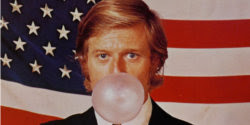 “The Candidate” (1972)
“The Candidate” (1972)
Forget the Sundance Kid and Bob Woodward, Robert Redford’s turn as would-be Senator Bill McKay is possibly his greatest role. It’s certainly his least narcissistic and most spiritually ugly turn – as the son of a popular former governor, McKay is gradually unraveled and exposed to be as cosmetic as his dashing side-burns; a fate only compounded by winning the damn election. Whatever timid political convictions the character is depicted as possessing are steamrolled in favor of refashioning the man into a photogenic tabula rasa, a bespoke ‘man of the people’ grown like Ellen Ripley in a lab (a potential voter simply remarks, “Handsome is as handsome does”) who’s able to coast on a roster of meaningless platitudes right into public office. Not so much worn down by the political machine as ground by it into a fine patty, “The Candidate” is ostensibly a comedy from the man who would go on to direct “Fletch,” with Michael Ritchie’s handheld deadpan style sly, impressive and vaguely horrifying, especially with Peter Boyle hovering over McKay as a scruple-free campaign manager. The indignities depicted in the film (gross self-censorship, vile manipulation of advertisements that encourage voters to choose a candidate “the way they choose a detergent”) are of course laughably meek by the standards of the dubious chicanery that abounds in political campaigns today, but McKay’s ticket, run on the promise of restoring “hope and faith in government,” has obvious timeless implications beyond its early 1970s setting. Its famous last line (the clueless inquiry: “What do we do now?”) is a touch didactic and McKay’s descent perhaps now an overly familiar one, but when his father eventually slaps his tousle-haired sprog on the shoulder and chuckles, “Son, you’re a politician!” the remark rattles through the rest of the film like a death sentence. [A-]
 “The Contender” (2000)
“The Contender” (2000)
Laine Hanson is about to become Vice President, but the headhunters are out in full force. It’s knives out for any female candidate, argues writer-director Rod Lurie, who then sets up a Chinese finger trap of a plot device, revealing Hanson’s possible participation in a collegiate orgy that sends the media into a tizzy. Through it all, Joan Allen’s Hanson perseveres, refusing to kowtow to her tormentors, which include an appropriately slimy congressman played by Gary Oldman, and pursues the office despite facing opposition from one side, and Puritanical unease from the other. “The Contender” has a talented cast (Jeff Bridges is a delight as a carefree Commander In Chief), but a film that tackles material this loaded shouldn’t cower in its final act to naked principle over truth, obscuring the issue with a last minute reveal that sours the entire film and degrades the experience to one fascinated by politics, but utterly oblivious to sexual matters. When it comes time to make a statement, the most forceful stand this meek film takes is Sam Elliot memorably growling, “The one thing the American people won’t stand… is a Vice President with a mouthful of COCK.” [C]
 “Dave” (1993)
“Dave” (1993)
As a now-charmingly naïve take on politics, Ivan Reitman‘s “Dave” is both watchable and utterly, hopelessly dumb. Kevin Kline stars as the hardline conservative President Bill Mitchell, who lapses into a coma only to be replaced by lookalike insurance agent Dave Kovic. To swallow “Dave,” you have to accept that this was the Clinton Era, where our Commander In Chief had serious Dude Appeal, a status that obscured the politics at play. As such, Kovic is much looser, funnier and, surprise, quite liberal, eschewing his predecessor’s stance and proving to be more pro-union and anti-big business. The Capra-fueled optimism mostly has its heart in the right place, and Kline is charming in a dual role, but the film laughably turns the job of President into an opportunity to showcase late-night policy sessions, with Charles Grodin acting as the entire cabinet, and moments where Kovic slashes massive public relations budgets with a smile and a wink. Its glib, what-if politics, cement the Gary Ross-penned script as from another era, or more accurately, highly outdated. [C+]
 “The Distinguished Gentlemen” (1992)
“The Distinguished Gentlemen” (1992)
Oh, Eddie Murphy of the 80s and 90s. We miss you. While “The Distinguished Gentleman” isn’t a great film by any stretch, it is a great example of the energy and creativity that Murphy once had. Not only does he give a terrific comedic performance, but Murphy actually flexes some decent dramatic chops that are rarely seen from him.
The film focuses on a Florida con man, Thomas Jefferson Johnson (Murphy), who uses the death of an incumbent candidate with a similar name to snag a seat in Congress. (The way in which he pulls it off and the depiction of voting trends is actually quite brilliant.) Why would he want to be a Congressman? Like one of his crew says: “That’s where the money is.” He and his band of criminals descend on Washington and quickly realize that they are way out of their league when it comes to pulling cons. Johnson gets swept up in the action, led by Dick Dodge (Lane Smith), until he realizes that, wait, he has a conscience after all. It’s when he tries to do the right thing and protect his citizens that he sees how absurd the political process actually is. As a loose re-telling of “Mr. Smith Goes to Washington,” the movie doesn’t exactly compare, full of flaws as it is. But it does manage to at least marginally represent the shady dealings that certainly take place in Washington and, if nothing else, it’s really damn funny. [B-]
 “Election” (1999)
“Election” (1999)
1999 was an amazing year for film, one of the reasons being films like “Election” that seemingly came out of nowhere and lodged in the public consciousness. This darkly comic film from Alexander Payne tells the allegorical story of a simple high school election for senior class president. Tracy Flick (Reese Witherspoon) is that obnoxious over-achiever that we all knew in high school: she’s involved in way too many clubs and activities, she has perfect grades and organizes an insanely intense campaign even though she’s running unopposed. It’s this last part that really irks one of her teachers, Jim McAllister (Matthew Broderick), which leads him to encourage (read: force) naïve and brainless jock Paul Metzler (Chris Klein) into running against Tracy. Payne’s film is clearly a microcosm of bigger political campaigns and how the candidates are rarely the ones pulling the strings, and like his previous film “Citizen Ruth,” “Election” kept the audience a little off-balance and wondering “Should I be laughing at this?” The answer is yes. The film is almost perfect in every way. The performances, especially Broderick and Witherspoon, are dead-on and the screenplay, based on the novel by Tom Perrotta (“Little Children”), is filled with brilliant dialogue and an overabundance of voiceovers from each of the main characters, which reflects the crowded field of candidates and lack of certainty regarding which character we should be rooting for. Required viewing for any true film buff, “Election” is that rare creation that will, without a doubt, stand the test of time. [A]
 “Gabriel Over The White House” (1933)
“Gabriel Over The White House” (1933)
A corrupt president gets into a car accident, believes he’s been visited by the Angel Gabriel, and becomes a totalitarian dictator who’s able to arrest and execute people at will. He’s the bad guy, right? Some villainous type eventually taken down by the hero? Not in Gregory La Cava’s “Gabriel Over The White House,” one of the most out-there political films ever made, a one-of-a-kind advocation of benevolent fascism that would give the Tea Party a collective heart attack if made today. Backed by William Randolph Hearst, and timed to the election of, and approved by, Franklin Roosevelt, it stars Walter Huston (father of John, grandfather of Danny and Angelica) as President Judd Hammond, a corrupt president who sees the light, gets rid of most of his cabinet, dissolves Congress when they impeach him and goes about tackling the depression, nationalizing the alcohol trade and executing the gangsters that have become the scourge of the country. Finally, he uses a new secret weapon to blackmail the world into peace, and is eventually acclaimed as a hero. It’s an unashamed piece of liberal propaganda, but a disturbing one; the imagery, particularly that of Hammond’s secret police, borders on fascist (bear in mind, this is the same year that Hitler came to power). It’s like a reactionary, militant version of “The West Wing,” but really it’s just an interesting time capsule/bonkers curio, led by a very strong performance from Huston (only a few years after taking the title role of another president, in D.W. Griffith’s “Abraham Lincoln.”). [C]
 “The Great McGinty” (1940)
“The Great McGinty” (1940)
With his directorial debut, for which he won an Academy Award for Best Screenplay, Preston Sturges’ kicked off his career with a bang (legend has it, he sold the idea for ‘McGinty’ to Paramount under the condition he direct it). A diverting and ironic little political satire by way of cautionary tale, the picture stars Brian Donlevy as the titular “hero” — a bum on the breadline with a thuggish streak. When he hears that a group of corrupt politicos are paying $2 per vote for a figurehead patsy mayor, he votes a whopping 37 times and catches the attention of these gangsters. Tickled by his clueless, brutish approach as he mouths off to them and everyone around him, the boss (Akim Tamiroff) hires him to collect past-due protection money. McGinty passes every test with flying colors, and eventually becomes his political protege, graduating to alderman, mayor and eventually governor — all the while being the puppet on the end of the mob’s strings. But when he falls in love with his secretary/fake wife Catherine (a charming Muriel Angelus) — the sham wedding only occurred so he could get the female vote when he was running for mayor — things begin to change. She and her children awaken a caring, compassionate side in McGinty and press him to quit being the stooge for his crooked bosses. Refusing to bend to their wishes and erect expensive monuments that line their pockets, McGinty is headed for a fall from grace. Whipsmart, engaging and funny, “The Great McGinty” is an entertaining parable and a sign of only greater things to come from Preston Sturges [B+]
 “In The Loop” (2009)
“In The Loop” (2009)
Writer/director Armando Iannucci’s scathing political satire, loosely based on/spun-off of his BBC television series “The Thick of It,” which ran for six half-hour episodes and two specials from 2005 to 2007 (and has since had another series, with another on the way in 2012), is so on-the-money and realistic that we’re able to forgive its biggest flaw: it’s shot in the handheld, zoom-intensive documentary style we’ve all grown overly familiar with. Think “The Office,” except there is no acknowledgment of the camera here, so it’s more like a fly-on-the-wall approach to the material. But shooting style aside, it’s the vicious, vitriolic black humor that shines through. The jokes, one-liners and visual gags spew forth at a rapid rate; like those strobe-heavy anime cartoons known to induce fits of epileptic seizures to the viewer, so does “In The Loop” with guffaws. An endless barrage of pop culture references (we recall nods to “The Shining,” “The Omen,” “Eraserhead,” “The Crying Game,” ‘Harry Potter’ and many more we missed while in hysterical bouts of laughter) and a ridiculously high joke quotient, are reminiscent of “Airplane!” but with a realistic story. While “In the Loop” is apocryphal, it’s impossible to not draw comparisons to political events of this decade. We don’t see the highest government officials, we see the people who work behind the scenes where everyone is looking to gain an edge for their next career hurdle. Semantics is everything in this world. This is a sapid, smart, dark and mean-spirited comedy in the vein of Stanley Kubrick’s masterpiece “Dr. Strangelove,” with an ending that feels almost as apocalyptic, at least for the characters. Further proof of the film’s Kubrickian style is evident in ‘Loop’’s trailer as well, using the sped-up version of the William Tell Overture in a direct homage to “A Clockwork Orange.” But this film truly belongs to Peter Capaldi (“Local Hero”) as Malcolm Tucker (the only recurring character from “The Thick of It”), giving such a believable performance you’d swear he was this guy in real life, not a fantastic satirical creation. Every character he comes across falls in his wake of mean-spirited barbs. The rest of the cast is top-notch as well; all of them create fully-realized characters, and more importantly, avoid any semblance of caricature, which would’ve happened in the hands of less-capable filmmakers. [A-]
 “The Manchurian Candidate” (1962)
“The Manchurian Candidate” (1962)
What better way to tap into the nation’s Cold War anxiety than with a political thriller about communists brainwashing American soldiers? John Frankenheimer’s 1962 film follows Frank Sinatra as Major Bennett Marco, a man plagued by constant nightmares involving men of his platoon being killed by their Staff Sergeant Raymond Shaw (Laurence Harvey). After pursuing an investigation, it’s revealed that the troops were brainwashed by communists, with Shaw poised to follow any orders so long as he is shown a Queen of Diamonds. The forever-old Angela Lansbury plays his mother (despite being only three years older than Harvey), a secret commie who hopes to execute a plan allowing her to influence the U.S. President with her ideology. It’s a solid puzzle of a story chugging along with powerful forward momentum; incredibly absorbing even if both Soviet-paranoia and Sinatra-lead films usually find modern audiences uninterested. The 2004 update with Denzel Washington wasn’t badly received, but the original stands head and shoulders above, thanks to its weirder passages: Marco and love interest Eugenie (Janet Leigh) have such an odd conversation about states, railroad lines and old Chinese men that many concocted a “brainwashing theory” over the scene. There’s also the nightmare sequence, in which the soldiers are drugged to think that a presentation by Communists showing off new assassin Shaw is actually an informational meeting about hydrangeas, attended only by older housewives. The reality and dream images are cut together disturbingly, going back and forth in a dissonant, maniacal fashion. It’s a pretty ingenious, expertly handled scene, and you can’t really remake that. [A]
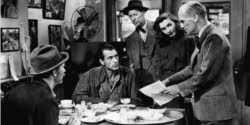 “Meet John Doe” (1941)
“Meet John Doe” (1941)
The creative cinematic marriage of Frank Capra and his screenwriter Robert Riskin ended in divorce after “Meet John Doe,” and on the evidence of this film it’s not difficult to imagine why. Here is an oddball, largely unpalatable hunk of Capra-corn, a cock-eyed anti-fascist parable pure and naked, which defies the comparatively comfortable trajectories of the director’s earlier “It’s A Wonderful Life” and “Mr Smith Goes to Washington.” With her journalistic career on the skids, Ann Mitchell (Barbara Stanwyck) pens a pseudonymous farewell letter under the by-line “John Doe,” and has her creation spout missives about the dreariness of contemporary existence — “I protest the state of civilization” – and concludes the column by declaring Doe intends to kill himself on Christmas Eve. Roping in a bumpkin who dreams of being a baseball player (Gary Cooper), Stanwyck’s wily scheme sprouts legs after a platitudinous radio speech made up of treacly homilies (“Wake up, John Doe. You’re the hope of the world!”) and we’re asked to believe a spontaneous political movement is born overnight; ready-made to be destroyed by the very people who created it. With Walter Brennan screaming about “healots” throughout the entire film’s running time, Cooper’s “yokel appeal” — indicative of what critic Richard Corliss dubbed a streak of “rube psychosis” in Capra’s work – is key to the entire duplicitous shebang. But the ethical quandary is bunk (why should the people invest in a folk hero invented by a journalist, and a careerist one to boot?), even if the intent is admirable. “Meet John Doe” is a worthwhile film which, like Wilder’s “Ace in the Hole” after it, harkens back to a mythical age of journalism where reporters were expected to adhere to a set of ethical editorial standards. But it’s also an inescapably flawed, vaguely condescending one – though Stanwyck and Cooper are typically dependable, the sizzling chemistry between the pair on display in the same year’s “Ball of Fire” has mysteriously vanished. [C+]
 “Mr. Smith Goes To Washington” (1939)
“Mr. Smith Goes To Washington” (1939)
James Stewart’s filibuster at the end of “Mr. Smith Goes To Washington” is one of the finest scenes of his career and one of the most memorable moments in classic American cinema. And while it’s now considered by some to be somewhat quaint and naively idealistic, in the way that Frank Capra films generally are, it’s easy to forget that at the time politicians branded the film as anti-American and pro-Communist, and revisiting the movie now, it’s surprising just how affecting it still is. Marking the second collaboration between Stewart and Capra, following their charming “You Can’t Take It With You,” the story follows wide-eyed Jefferson, a Boy Rangers leader who is suddenly ushered into the U.S. Senate when his state representative dies. Crooked political boss Jim Taylor thinks the green Jefferson will be easily manipulated when he finds himself in over his head, but is surprised when Jefferson fights back when some proposed legislation will build a dam on the site of a campground. Backed up against a wall by the seasoned political power players and boxed in by a frame-up that his rivals hope will bounce him out of office, the film hinges on that last, great speech by Jefferson, and with Capra and Stewart working their magic it’s impossible to resist. With Jean Arthur cheering on from the gallery and Harry Carey’s seasoned mug as the President of the Senate smiling on, more than seven decades since it was first released, and in this era of deeply partisan and cynical government, you’ll wish there was someone as passionate and principled Jefferson Smith stomping the halls of Washington. “Will the Senator yield?” Hell, no. [A]
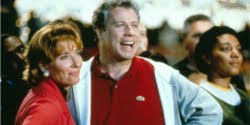 “Primary Colors” (1998)
“Primary Colors” (1998)
Mike Nichols is an accomplished director who has enjoyed success since his debut screen effort in 1966, but he’s rarely acknowledged for his thematic versatility. Just as his first attempt to paint on such a broad political canvas (“Catch 22”) was scuppered by the more zeitgeitsy and straightforwardly anarchic “M*A*S*H” in the early 1970s, “Primary Colors” had the indignity of being superseded by true events that were happening around the time of its 1998 release, and were deemed more interesting than fiction (namely the salacious and beyond parodic real-life fall-out from the worst of Bill Clinton’s “bimbo eruptions”: Monica Lewinsky). In a similar vein, though it came from a novel that positioned itself as a thinly-veiled attack/appraisal/exorcism of the Clinton Presidential bid of 1992, the mysterious luster around the source’s author “Anonymous” had dissipated with the unmasking of reporter Joe Klein some time before its Cannes premiere. All of these circumstances seemed to instantaneously render the film out-of-date and dead on arrival in the 1990s, but that’s to overlook that it has a message bigger than the sum of its parts. Sure, John Travolta’s broadly drawn aw-shucks Bill Clinton impression suffers in comparison to Emma Thompson’s deft work as his spouse, and it’s slightly tough to buy the totality of Adrian Lester’s convenient journey from doe-eyed optimist through to done-with-the-system, disillusioned politico, but it’s nonetheless a big, drippy sap-fest that’s unafraid to let it all hang out; and a film in serious need of reappraisal. Aging well with the distance of more than a decade, even Kathy Bates’ rambunctious performance that dips into speechifying at the conclusion can’t derail what’s preceded it – the metaphorical and literal death of political idealism. Nichols hasn’t managed anything comparable since. [B+]
 “Recount” (2008)
“Recount” (2008)
Director Jay Roach (responsible for the “Austin Powers” trilogy and the first two “Meet The Parents” films) showed an aptitude for the political genre with 2008’s “Recount,” commanding an impressive cast including Kevin Spacey, Denis Leary, Laura Dern, Tom Wilkinson, and John Hurt, as they squabble and seethe amidst 2000’s controversial Florida recount. We have our heroes – Democratic strategist Ron Klain (Spacey) and our villainess, Dern’s Katherine Harris, Florida’s Secretary of State and a co-chair on the Bush campaign. Roach lets the film play at the heightened pace of a thriller, which makes the ridiculousness of it all positively laughable. It’s a fleet-footed film that filters its politics through simple lenses – good Democrats, bad Republicans, leaders and followers, and lots of news coverage that needs to be watched diligently. The resulting product is accessible and humorous, but also deadly serious in depicting (albeit with a slight bias) the actual events that got us here. It’s no wonder Roach is back to politics again with “Game Change”, working again with “Recount” writer Danny Strong. The two know how to make the potentially terrifying reality seem strangely funny in retrospect. [B]
“Seven Days In May” (1964)
They just don’t make ’em like they used to. Save for the occasional, unlikely adult drama like “The Ides Of March,” or “The Social Network,” Hollywood doesn’t make pictures like John Frankenheimer’s simmering political drama, “Seven Days In May” anymore. If you want to see an example of a riveting drama wherein people only talk, argue or debate, this is it. Starring Kirk Douglas, Burt Lancaster, Fredric March, Ava Gardner, Martin Balsam and an Oscar-nominated Edmond O’Brien, this simmering pot-boiler focuses on hubris-filled American General Scott (Lancaster), sick to death of the bureaucracy and politicking of Washington. After the President (March) ratifies a disarmament treaty with Russia, the militant and aggressive Scott reaches his breaking point with what he perceives to be the spineless figures in D.C. His aide, Colonel Casey (Douglas) accidentally comes across a strange, secret plan he eventually believes is a military coup to overthrow the government. Torn by his loyalty to his General and his duty to his country, the Colonel makes the heavy decision to inform the President and his aides. Risking his name and career on what could be perceived as a wild claim, Casey then becomes part of a time-ticking group of White House loyalists who try and uncover the treasonous subterfuge. Simple, straightforward, but searingly effective in its depiction of the point when patriotism curdles into fascism, Frankenheimer contructs an urgent, suspenseful timebomb of a picture that is classic filmmaking to a tee. [A-]
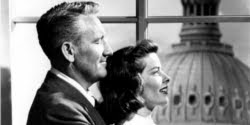 “State of the Union” (1948)
“State of the Union” (1948)
Nearly a decade after “Mr. Smith Goes To Washington,” it turned out Frank Capra had even more to say about the American political system in “State Of The Union,” albeit with a different twist. Where ‘Washington’ explored a pure man who comes up against a corrupt system, ‘State’ revisits that corrupted political sphere and watches what happens when it corrupts a decent man. The always reliable Spencer Tracy plays that man, Grant Matthews, an aircraft tycoon who is encouraged to run for the President of the United States by newspaper titan Kay Thorndyke (a ravishingly beautiful Angela Lansbury), who promises to use her papers to help push his candidacy. A savvy political machine assembles around him (including a memorable Van Johnson as his campaign manager) and even Grant’s estranged wife (Katherine Hepburn, of course) agrees to keep up appearances though their relationship is on the rocks. So yes, you know where this is going. As the battle for the Republican candidacy gets fiercer, Grant continues to compromise his ideals until he no longer is the man who first decided to try and take the biggest house in the land. And following the template of ‘Washington’ it all culminates in a final speech in which the ideals of the American people are raised up as something that politicians should aspire to uphold, not circumvent. This time around, the power of Capra’s tale is less potent. It’s not that the message isn’t important or even prescient, but it’s hard to sympathize with a rich Republican who finally learns a lesson versus a small town kid who refuses to play the Washington game. But again, the ingredients here at least individually still make this a worthwhile watch. It’s kind of amazing to see Lansbury play such a coldly calculating character so long before “The Manchurian Candidate,” and as we said, Johnson is a pure ball of energetic delight. Needless to say, Tracy and Hepburn are one of the greatest on-screen pairs of all time, and while this isn’t their brightest moment, if you have any affinity for the duo, the third act will still tug at those heartstrings. So yes, running for political office causes even the most strong willed to fold — what else is new? But if you can get the girl in the end, it seems you can still come out of it smelling like roses. [B-]
 “Wag The Dog” (1997)
“Wag The Dog” (1997)
Barry Levinson’s satire “Wag the Dog” was not necessarily supposed to be a hold-up-the-mirror reflection of present-day American society. However, it is hard to watch without remembering weeks after the release how much it did just that. It was really intended to be about the Gulf War, the first Bush Administration (before we had to call it that) and the idea that he could have easily made the whole thing up. In fact, in retrospect, the notion that the poor-quality videos from the Gulf War could have been fabricated feels nauseatingly plausible, and the fact that such a war would boost polls is a no-brainer. These ideas sourced from Larry Beinhart’s ’93 wacky satirical novel “American Hero” were worked into “Wag the Dog” by screenwriter and dialogue master, David Mamet and director Barry Levinson , who also included the idea that the war was not only to get votes but to distract from a sex scandal. The fact that soon after the movie’s release a politically struggling, Lewinski-snuggling Bill Clinton bombed Kosovo, showed that reality can also imitate art, more often than we care to consider. The impact of the media post-9/11, and Bush’s willingness for photo-ops during his ‘War on Terror,’ even at the most inappropriate of times, left the satirical love of all things flag-waving in “Wag the Dog” in the dust. Robert DeNiro plays the political fix-it guy to Anne Heche’s Presidential Gal Friday, together with Dustin Hoffman, the Hollywood producer, they make the diversionary fake-war happen. Woody Harrelson is their ‘hero’ who instead turns out to be criminally insane (not ideal) and Kirsten Dunst is their fake Albanian orphan with only a bag of Tostitos (which are later, with green-screen, magically turned into a kitten) to keep her company in the war. “Wag the Dog” is still a surprisingly likable film considering it confirms every worst fear you might have had about the U.S. Government, its people and its media in the ’90s. This is due in no small part to Mamet’s fantastically paced and effortlessly delivered dialogue, with every quip landing feet first, as well it should in any political satire worth its weight in “Yes, Minister!” DVDs. However over 10 years and a second Bush later, it also feels slightly dated and less dark then it did. [B+]
Honorable Mentions: We’ve covered a few bases here (bar things like “J.F.K.” and “Dr. Strangelove” which didn’t quite seem to fit our remit), but there are a couple of other ones that we didn’t quite have time or space to look at. Aspects of “Syriana” sort of apply, namely Jeffrey Wright‘s storyline, but it’s not quite enough, and it’s arguably the film’s weakest bit of plot, thanks to an unnecessary father/son relationship that feels truncated. Documentary-wise, 1993’s “The War Room” is a pretty amazing look behind the scenes at the Clinton campaign, and one that has clearly informed many of the subsequent political films.
One such movie? Surprisingly, the romantic-comedy “Definitely Maybe,” which has a political sub-plot running throughout, with Ryan Reynolds as an aspiring speech-writer/campaign manager. It’s a decent enough entry in the genre, as far as rom-coms go, but it’s not exactly the most incisive look at the political world that you’ll find. There were some internal debates as to whether Robert Altman’s masterpiece “Nashville” qualified, and we ultimately decided that it didn’t, although it does take place against the backdrop of a political rally.
We didn’t have enough time to track down the original, Oscar-winning 1949 version of “All The King’s Men,” the veiled story of charismatic Louisiana governor Huey Long, but by all accounts it’s better than the 2006 Sean Penn remake, although that probably wouldn’t be very hard. Finally, we’ve heard good things about 1979’s “The Seduction of Joe Tynan,” written by and starring Alan Alda (with a cast also including Meryl Streep and Rip Torn), but didn’t find the time to fit it in. And of course, “Citizen Kane” is partly about a politician, but that’s a little obvious… Any others we’ve missed? Sound off below.
— Erik McClanahan, RP, Sam Price, Oliver Lyttelton, Kevin Jagernauth, Samantha Chater, Christopher Bell, Matthew Newlin, Gabe Toro, Kimber Myers, Mark Zhuravsky




